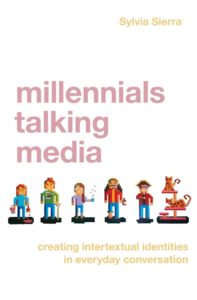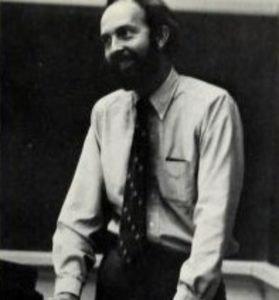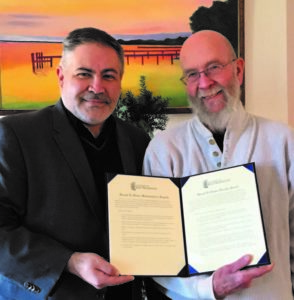UMW Linguistics Alum Sylvia Sierra ’09 to Release ‘Millennials Talking Media’
From Professor and Chair of the Department of English and Linguistics Gary Richards:

2009 UMW alumna Sylvia Sierra is an assistant professor in the Department of Communication and Rhetorical Studies at Syracuse University
Congratulations to alumna Sylvia Sierra ’09! She has written the book Millennials Talking Media: Creating Intertextual Identities in Everyday Conversation, scheduled for release from Oxford University Press in September 2021.
 “This book examines how a group of U.S. Millennial friends in their late twenties embed both old media (books, songs, films, TV shows) and new media (YouTube videos, video games, and internet memes) in their everyday talk for particular interactional purposes. Multiple case studies are presented featuring the recorded talk of Millennial friends to demonstrate how and why these speakers make media references in their conversations. These recorded conversations are supplemented with participant playback interviews, along with ethnographic field notes. The analysis demonstrates how the speakers phonetically signal media references in the speech stream, how they demonstrate appreciation of the references in their listening behaviors, and how they ultimately use media references for epistemic, framing, and identity construction purposes, often (but not always) when faced with epistemic, or knowledge, imbalances as well as interactional dilemmas, or awkward moments in interaction. The analysis shows how such references contribute to epistemic management and frame shifts in conversation, which is ultimately conducive to different forms of Millennial identity construction. Additionally, this book explores the stereotypes embedded in the media that these Millennials quote, and examines the effects of reproducing those stereotypes in everyday social life. This book explores how the boundaries between screens, online and offline life, language, and identity are porous for Millennials, and weaves together the most current linguistic theories regarding knowledge, framing, and identity work in everyday interaction, illuminating the interplay between these processes.”
“This book examines how a group of U.S. Millennial friends in their late twenties embed both old media (books, songs, films, TV shows) and new media (YouTube videos, video games, and internet memes) in their everyday talk for particular interactional purposes. Multiple case studies are presented featuring the recorded talk of Millennial friends to demonstrate how and why these speakers make media references in their conversations. These recorded conversations are supplemented with participant playback interviews, along with ethnographic field notes. The analysis demonstrates how the speakers phonetically signal media references in the speech stream, how they demonstrate appreciation of the references in their listening behaviors, and how they ultimately use media references for epistemic, framing, and identity construction purposes, often (but not always) when faced with epistemic, or knowledge, imbalances as well as interactional dilemmas, or awkward moments in interaction. The analysis shows how such references contribute to epistemic management and frame shifts in conversation, which is ultimately conducive to different forms of Millennial identity construction. Additionally, this book explores the stereotypes embedded in the media that these Millennials quote, and examines the effects of reproducing those stereotypes in everyday social life. This book explores how the boundaries between screens, online and offline life, language, and identity are porous for Millennials, and weaves together the most current linguistic theories regarding knowledge, framing, and identity work in everyday interaction, illuminating the interplay between these processes.”Richards Presents at Tennessee Williams/New Orleans Literary Festival

Professor and Chair of English Gary Richards
Gary Richards, Professor of English, recently led the Books and Beignets discussion of Tennessee Williams’s The Rose Tattoo at the Tennessee Williams/New Orleans Literary Festival, held virtually March 24-28, 2021. The discussion marked the seventieth anniversary of The Rose Tattoo‘s Broadway opening as well as Richards’s fifteenth year of leading this annual event.
McAllister Publishes Article, Book Review

Professor of English Marie McAllister
Marie McAllister, Professor of English, recently published “Rhetoric, the Pox, and the Grand Tour,” which appeared as the lead article in the April 2021 issue of Eighteenth-Century Life.
McAllister also recently published a review of Itch, Clap, Pox: Venereal Disease in the Eighteenth-Century Imagination, by Noelle Gallagher, in Journal of the History of Sexuality.
Mathur Co-Leads Workshop on Intersectionality and Inclusion

Professor of English Maya Mathur
Professor of English Maya Mathur co-led the workshop, “Intersectionality and Inclusion in the Early Modern Classroom,” with Elisa Oh of Howard University. The workshop took place during the annual conference of the Shakespeare Association of America, which was held virtually from 30 March to 4 April 2021. The workshop drew on Kimberlé Crenshaw’s theory of intersectionality to examine how the overlapping axes of our identities and those of our students shape our pedagogy.
Mathur Publishes Entry in the Encyclopedia of Global Shakespeare

Professor of English Maya Mathur
Professor of English Maya Mathur contributed the encyclopedia entry, “Twelfth Night (Dir. Tim Supple, UK, 2003),” to the Palgrave Encyclopedia of Global Shakespeare, edited by Alexa Alice Joubin and published online by Palgrave Macmillan in 2020. The entry examines the role of immigration in the production history and reception of Tim Supple’s Twelfth Night, a television adaptation of William Shakespeare’s play that was first broadcast in 2003 by the British television channel, ITV.
Richards Pens FLS Editorial on Hurston, Welty for ‘Great Lives’ Lecture

Professor Gary Richards, chair of the Department of English and Linguistics
Professor of English and Chair of the Department of English and Linguistics Gary Richards penned an editorial in The Free Lance-Star in advance of his “Great Lives” lecture on authors Zora Neale Hurston and Eudora Welty on Thursday, March 4. The lecture can be viewed here.
THE AMERICAN South arguably has the nation’s most vibrant, celebrated regional literature, and key among its writers are outstanding women, ranging from Harriet Jacobs, Constance Fenimore Woolson, and Kate Chopin in the 19th century to LeAnne Howe, Jesmyn Ward, and Karen Russell in the 21st century.
The 20th century is a particularly rich era, and one thinks of a constellation of Southern women writers from this period whose works have become integral to our national literary heritage: Margaret Mitchell’s “Gone with the Wind” (1936); Flannery O’Connor’s macabre short stories; Harper Lee’s “To Kill a Mockingbird” (1960); Alice Walker’s “The Color Purple” (1982); and Dorothy Allison’s “Bastard Out of Carolina” (1992).
However, two female writers from this era stand apart: Zora Neale Hurston (1891–1960) and Eudora Welty (1909–2001). Read more.
Honoring a Master
Privately funded faculty award for English professors recognizes the value of extraordinary teaching.

Donald E. Glover as pictured in the 1971 edition of The Battlefield.
In 1971, the average cost of a postage stamp was 8 cents; Walt Disney World opened in Orlando, Florida; and Intel released its first microprocessor. In Fredericksburg, Virginia, a Mary Washington English professor made an indelible impression on a member of the Class of 1971.
Fifty years later, that alumna has fully funded a new faculty award to honor the memory of Distinguished Professor Emeritus of English Donald E. Glover. During his tenure, Dr. Glover was a widely respected and beloved member of the faculty. He began teaching at Mary Washington in 1961 and served as department chair from 1970-73. Glover retired in 1998 after 37 years of service; he passed away in August of 2020.
While the donor still wishes to remain anonymous, she first alerted the University in 2018 of her intentions as defined in her estate plans. She then requested that Glover be informed so he would know how important his teaching had been to her during those formative years at Mary Washington.
Dr. Gary Richards, professor and chair of the Department of English and Linguistics, met with Glover in 2018 to share news of this faculty award, as well as the future creation of a named endowed scholarship.

In 2018, Dr. Gary Richards (left) met Dr. Donald E. Glover (right) and shared news of two special gifts from a former English student.
“Don was long retired when I became Chair,” says Richards, “but this award brought me in contact with him and his lovely wife, Alice. Even though he was already struggling with his health then, I got a glimpse of the professor who made such an impact on our donor. I am delighted that Don Glover is being honored in this way.”
The donor recalls that Glover was light on lectures, yet strategically led his students to understand and appreciate works of literature by asking questions to stimulate critical thinking and discussion. She says students learned for themselves as they came to realize the full meaning and importance of what they had read. She decided to go ahead and fund this award now in the hope that English faculty can follow in Glover’s footsteps, while having a positive and lasting impact on students’ lives.
Richards says the award’s focus on teaching acknowledges Glover’s long and distinguished career at Mary Washington. “This award documents the life-impacting teaching that professors in our department have been doing for decades,” says Richards. “It also documents the generosity of this alumna, who so carefully looked backwards to her experiences at UMW and forward to other students’ experiences.”
While the department is fine-tuning details for the application and evaluation process, Richards stresses the value of this new faculty award for an outstanding professor of English. “This is in perfect keeping with UMW’s focus on undergraduate teaching and stands to buoy faculty who are exerting such winning energies in this arena,” he says. “And, as I hope we all know, affirmed and energized professors carry that excitement into the classroom, which in turn energizes students.”
Details for applying for the new Donald E. Glover Faculty Award will be available soon.
For information about establishing estate gifts or funding endowed awards and scholarships, contact the Office of Advancement at advance@umw.edu or 540-846-0470. UMW honors requests for anonymity.
Rafferty To Give Virtual Reading to Michigan Writers’ Series

Associate Professor of English Colin Rafferty
Assistant Professor of English Colin Rafferty will give a virtual nonfiction reading tonight at 7:30 p.m. on Zoom to the Grand Valley State University’s Writers Series in Grand Rapids, Michigan. Those who wish to attend can contact the GVSU Department of Writing for the Zoom link. Read more.
